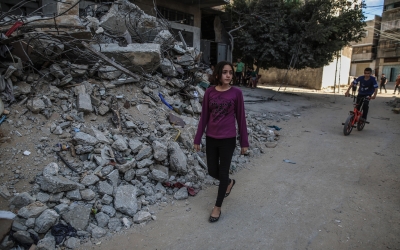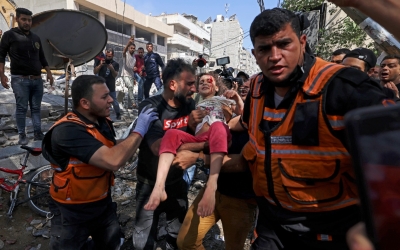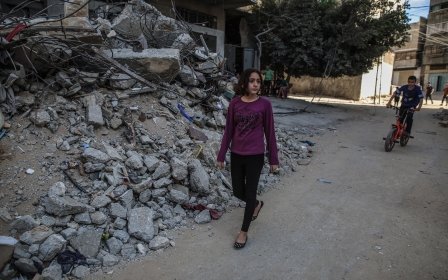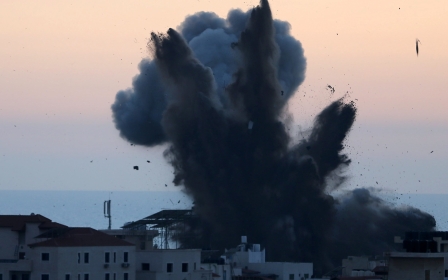Israel-Palestine: Ceasefire holding as aid arrives in bomb-shattered Gaza

The ceasefire between Israel and Hamas in Gaza was holding on Saturday, as humanitarian aid began to enter the besieged enclave ravaged by 11 days of bloodshed.
As thousands of displaced Palestinians returned to their homes, international focus turned to the reconstruction of the bomb-shattered Gaza Strip.
Convoys of lorries carrying aid began passing into Gaza through the Karem Abu Salem crossing after it was reopened by Israel, bringing much-needed medicine, food and fuel.
The UN's Central Emergency Response Fund said it had released $18.5m for humanitarian efforts.
US President Joe Biden promised to help Palestinians who lost their homes as he offered prayers on Friday for the ceasefire that started earlier that day to hold.
Biden, who said he had told Israel to stop "intercommunal fighting" in Jerusalem, also stressed "we still need a two-state solution. It is the only answer, the only answer".
Meanwhile, Israeli forces detained nine Palestinians from their homes and in the streets of occupied East Jerusalem on Saturday, witnesses told the Wafa news agency.
They said one person had been detained from his home in the Isawiyya neighbourhood and four from the Old City of Jerusalem after raiding their home had been raided and searched.
Four more were detained near al-Aqsa Mosque.
Blinken visit
A source familiar with planning said on Saturday that US Secretary of State Antony Blinken would visit Israel and the Palestinian Authority in the occupied West Bank on Wednesday and Thursday, hoping to build on the ceasefire mediated by Egypt with US support.
Egypt sent a delegation to Israel on Friday to discuss ways of firming up the ceasefire, including with aid for Palestinians in Gaza, Hamas officials told Reuters.
The delegates have since been shuttling between Israel and Gaza, with talks continuing on Saturday, the officials said.
Tens of thousands of Gaza residents had ventured out on Friday for the first time in days, checking on neighbours, examining devastated buildings, visiting the sea and burying their dead.
Rescuers there said they were working with meagre resources to reach any survivors still trapped under the rubble.
Nazmi Dahdouh, 70, said an Israeli strike had destroyed his home in Gaza City.
"We don't have another home. I'll live in a tent on top of the rubble of my home until it's rebuilt," the father of five said.
'Exceptional success'
In total, Israeli air strikes have killed 248 people including 66 children since 10 May, and wounded 1,948 others, the health ministry has said.
Large areas have been flattened and some tens of thousands of people have been displaced.
Rockets fired from Gaza claimed 12 lives in Israel, including one child, a teenager and an Israeli soldier, with one Indian and two Thai nationals among those killed, Israeli authorities say. Some 357 people in Israel were wounded.
Both sides claimed victory after the Egypt-brokered truce, which also included Gaza's second most powerful armed group, Islamic Jihad.
Israeli Prime Minister Benjamin Netanyahu dubbed the bombing campaign an "exceptional success".
For its part, Hamas' political chief Ismail Haniyeh said the group had "dealt a painful and severe blow that will leave its deep marks" on Israel.
He also thanked Iran for "providing funds and weapons".
Iran itself praised a "historic victory" and reaffirmed Tehran's support for the Palestinian cause, while there were demonstrations in support of Palestinians in Jordan, Libya and elsewhere.
Middle East Eye delivers independent and unrivalled coverage and analysis of the Middle East, North Africa and beyond. To learn more about republishing this content and the associated fees, please fill out this form. More about MEE can be found here.






